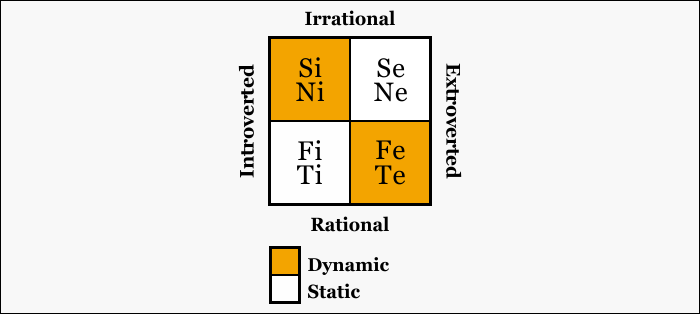There are a lot of ways how we can define the aspects, but most of them are primitive and illogical. In this publication, we will share with you the only real definition of it. So read and memorize:
Each aspect comes from its own information trait: Sensing (S), Intuition (I), Logic (T) and Ethics (F). These traits don’t relate to socionic types (Logic is not what logical types “do”, as you could think), they come from the way how our world is organized. Each trait produces its own types of information: introverted (i) and extroverted (e).

So, first of all, our reality consists of physical objects, which in socionics we call Sensing. The way we can feel these objects refers to introverted sensing: colors, smells, tastes, etc… Whereas extroverted one refers to information about how one objects can affect others. For example, this apple is round and sour-sweet (Si); it is nutritious and it can quench hunger for a while (Se). As you can see with the help of Si we have described the explicit qualities of the object, and with the help of Se – how it can affect us.
We can also say that Si is a dynamic aspect, and Se is static. This means that the Si describes the explicit qualities of the object, while the Se – abstract. For example, we can feel the taste of an object (Si) at a particular moment of time with the help of our senses, while its nutritional value (Se) is an abstract quality, not expressed in a particular sense. Next, we will see the manifestation of these properties on the example of other traits.
The other part of our reality is events that we relate to Intuition. If objects exist in space, then events exist in time. In other words, events are what happens to physical objects. Introverted intuition is information about how events flow from one to another; it is the probability of certain events; it is the trends we observe. The perception of a Ni allows us to feel the time and flow of events in it. Extraverted intuition, in turn, is information about new versions of events. It gives us an idea of what could have happened in our current reality. Because Ni is a dynamic aspect, it characterizes visible changes, while Ne is a static aspect, so related ideas exist only in our imagination.
Thus, our world can be divided into objects (what it consists of) and events (what happens in it). Sensing and intuitive information is perceptual, so we also call it irrational. As they interact with each other, objects and events set our world in motion, which in turn can be described with logical and ethical information. This information is reflective, so we also call it rational.
Thus, by observing how objects create events, a subjective response is formed in our psyche – we describe it with the help of socionic Ethics. For example, we are upset by the information that fires have destroyed many forests this summer. This is an example of a manifestation of the introverted ethics aspect – information about subjective evaluations. The attitude itself is abstract and manifests itself in some concrete reactions and actions. For example, “when I learned about fires, I signed up as a volunteer”. Here we already have extraverted ethics information.
In its turn, socionic Logic is objective and characterizes the way the world around us is organized. Thus, with the help of introverted logic, we understand the causes of events and the regularities behind them: for example, why it is light and hot during the day and dark and cold at night. This information is static because it characterizes the abstract information about the device of phenomena. In turn, extraverted logic is information about what to do to get the expected result. For example, how to warm up in winter or how to choose tickets for a summer trip to the sea. Extraverted logic – is dynamic, because it describes the specific order of action, the instruction to be followed.
Thus, we went through all aspects. Now, for convenience, we will summarize them using concise terms. As we said, Sensing is objects: Si – feelings from them, Se – their abilities; Intuition is events: Ni – their shifting, Ne – their variants; Ethics is a subjective response to reality: Fi – our attitudes, Fe – our reactions; and Logic is an objective understanding of reality: Ti – regularities, Te – technologies.
That’s all. I hope that now you have a better understanding of how the aspects in socionics are arranged.
